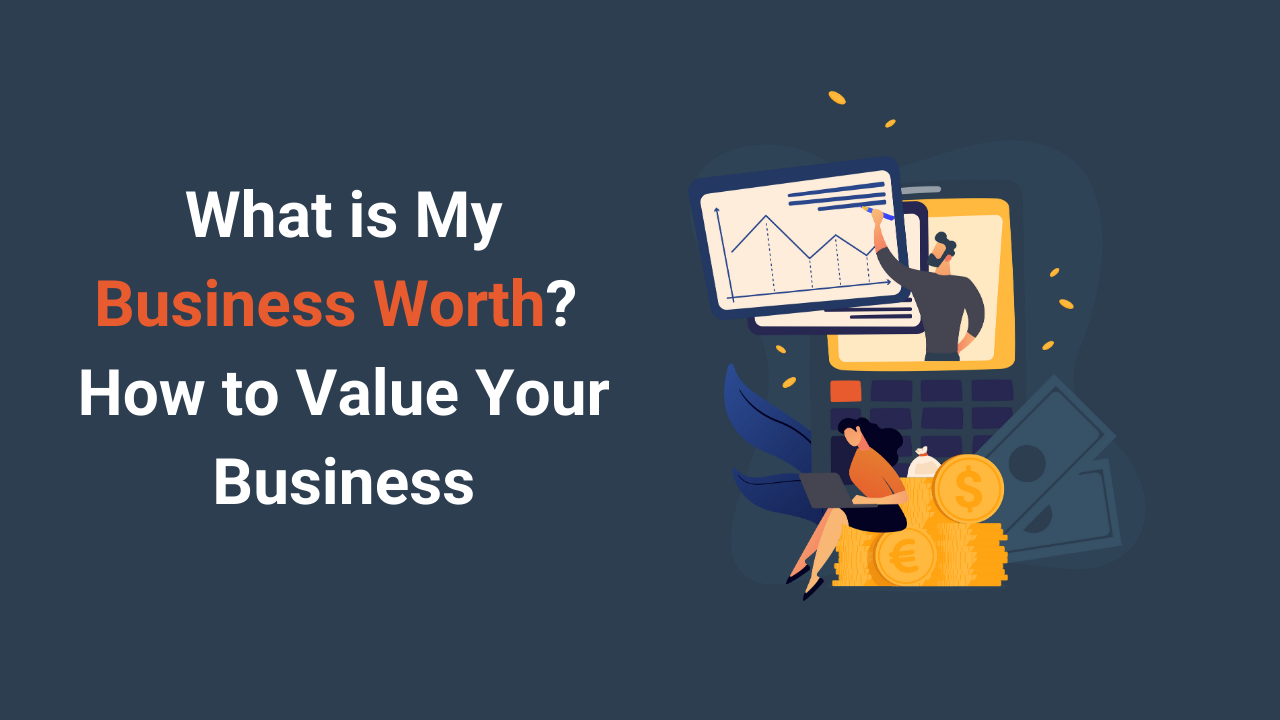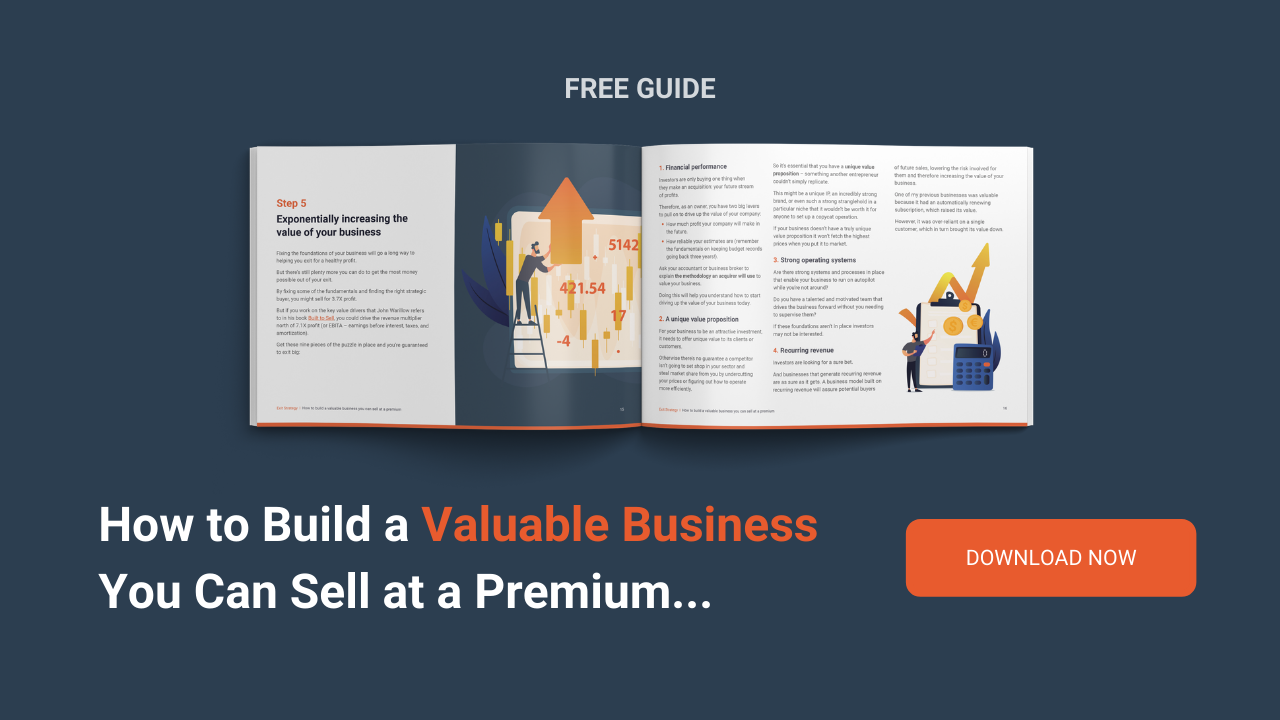What is my business worth?
Dec 04, 2020
Your business is worth whatever someone is willing to pay for it.
But if you’re thinking about your exit strategy, it’s crucial you have an idea of what that might be before you take your company to market.
Otherwise, you could let it go for a lot less than its worth.
In this short guide, I’ll go over what valuation models you can use to find out what your business is worth…
And why you should take these with a grain of salt if you want to get what your business is worth when you come to sell.
How to value your business today
Want to know what a buyer will be willing to pay for your business if you put it up for sale today?
Use the widely available EBITDA multiples by industry to get an idea of what your business is worth.
Simply multiply your company’s annual revenue for the last tax year by your industry’s Earnings Before Interest, Taxes, Depreciation, and Amortization (EBITA) multiplier.
Has that number given you a shock?
Is that all your business is worth?
It’s likely a potential buyer will offer an even lower multiple if you take it to market today.
And if you accept this, you’ll be selling yourself short...
The problem with business valuation models
It’s not easy to find a formula that gives you an accurate idea of the value of your business.
That’s because most valuation models look to the past, and not the potential value you’ve worked to build in your business.
The question "what is my business worth?" is, therefore, best answered when you clarify it with the question: "to who?"
Treating your business like a product
Most business owners fail to get an accurate idea of what their business is worth because they don’t put themselves in potential buyers’ shoes.
Think about how you take a product to market – you start with a problem you’re trying to solve and then identify an ideal client.
Your focus is on creating value for the customer.
Most business owners forget all this when it comes to selling their most important product – their business.
And so, after years of hard work and sleepless nights chasing growth and topline revenue, they wonder why their business is only worth an average of 3.66 times its annual revenue:
 (Source: Value Builder)
(Source: Value Builder)
Beyond a business valuation
Your business can be worth so much more than a valuation indicates.
While a business valuation is handy for getting a rough idea of what an investor might assume your business is worth before they’ve taken a look under the hood, it’s definitely not the price you should accept if your business runs without you and has a steady stream of recurring revenue in place.
So, instead of setting the asking price for your business on a valuation, I strongly recommend that you think about driving up your company valuation, regardless of size or industry.
And that means focusing on executing a well-designed exit strategy that increases the value of your business.
Thinking like a buyer
When it comes to selling your business and driving up the value, you need to start thinking like a potential buyer:
- What key issues are they dealing with in their business?
- What threats and opportunities are they facing?
- What problems do they have that need a solution?
When you look at your business the way a potential buyer would, you notice things you might otherwise ignore, including improvements you can make and best practices you can adopt.
Stephanie Breedlove started a payroll company in 1992, and by 2012 they had hit $9 million in annual sales. She sold for $54 million – close to six times revenue. Listen to her story.
Rod Drury founded Xero, a cloud-based accounting platform. Drury got the capital from selling another company, AfterMail, for $35 million ($15M plus $20M in a potential earn-out). Not bad for a company with a little more than $2M in revenue. Listen to his story.
These are just a few examples of entrepreneurs that dramatically drove up the value of their businesses by thinking like a buyer.
The trouble with business valuation models
When a professional advisor values your business, they usually give it a price tag of some small multiple of your current net earnings, based on your historical revenues.
But as Stephanie and Rod’s stories – among many others, including my entrepreneurial journey – show, this is far from the end of the story.
And that’s because most valuation methods are designed around conventional businesses, not growth-oriented businesses.
Most importantly, conventional methods don’t take into account the buyer’s potential (the value a buyer will extract from their investment) in arriving at the valuation.
If your business provides strategic – as well as purely financial – benefits to a buyer then it could be worth multitudes more to them than a traditional business valuation would suggest.
Business valuation principles
Let’s take a dive into the valuation principles so you understand exactly what’s going to be going through the mind of an investor when they’re weighing what your business is worth.
Now, I’m not a financial advisor, and I don’t play one on the internet.
That being said, I’m an entrepreneur that’s sold my fair share of businesses, and I’ve picked up a few things along the way.
First things first:
In strictly financial terms, the value of a business comes down to the present value of the future income stream the company will generate.
The present value calculation factors in the discount a buyer would pay today for a stream of income in the future.
A valuation basically determines what an investor would pay for the future stream of net earnings of the business.
Typically, the Net Present Value formula will be used to calculate your business’s value:
My business is worth X (the investment) because it gives back a series of future cash (income) payments.
But when you think about it, an accurate valuation needs to take into account what a buyer is likely to do with your business.
Which is why it’s so important you think like a buyer.
For instance, if your ideal buyer can significantly improve the growth rate, market penetration or profitability of your business, you should realize a higher valuation, as they’ll be making far more each year from your business than a traditional valuation would suggest.
Market conditions
Valuations also vary depending on market conditions.
Changes in value occur because certain types of company are in greater demand than others, or because some sectors are perceived as more attractive than others.
For instance, subscription businesses with monthly recurring revenue (MRR) are particularly attractive to buyers right now.
While in the past, Web 2.0 companies were in demand. And before that document storage companies and enterprise software were a hot commodity.
If your product, industry, or business model is in vogue right now you should be realizing a higher valuation.
Financial exits vs strategic exits
There are two types of business exits that attract acquirers:
Financial ventures create value on exit via sale or IPO by assigning a value to the future profit-generating power of the business being sold.
Strategic ventures create exit value, on the basis of what profit it could generate through the buyer exploiting the underlying assets or capabilities of the entity being acquired.
The best business exit for you depends on your circumstances.
Smaller companies with limited growth potential are more likely to create value through net earnings and a financial exit.
However, as Stephanie and Rod’s stories show, it’s possible to position a small business for a strategic exit.
Realizing your business’s potential through a strategic exit
According to Geoff Green, author of The Smart Business Exit:
“A strategic business exit is when a seller brings strategic value to a buyer which can be leveraged to create significant gains in the buyer’s own business.”
A potential buyer will look at your business value from their perspective, so thinking like a buyer brings this value into sharper focus.
- Will your business provide the buyer with significant commercial opportunities?
- Will it help the buyer deal with a major problem or threat to their business?
If the value your business brings to a potential buyer helps achieve either of the above, the value starts to become strategic in nature.
And depending on the size of the opportunity or threat, the amount a buyer is prepared to pay could rapidly escalate.
If you can think broadly about how your business can add significant commercial opportunities for potential buyers – things they may not even have considered – you could walk away with a huge sum.
Here are some ideas:
- New products or services that help your buyer grow their business (keep in mind your product might support the sale of an existing product).
- You provide new technology, systems or processes that improve the buyer's existing products or services or make them more profitable.
- You provide products or services that help them expand their customer base.
- Your products and services provide a way for the buyer to sell more of their existing products or services to their customer base.
Closing thoughts
If you’re looking to sell your business, you need to know what price to hold out for.
And a traditional business valuation is a great starting point – especially if you want out now and aren’t planning on executing an exit strategy that’s going to dramatically drive up your company’s value.
But if you want to pocket the highest possible profit for the business you’ve poured your blood, sweat, and tears into then don’t settle for the basic valuation of your business.
Instead, look to turn your business into a valuable asset by removing yourself from the day-to-day running of your business, running your business like you plan to sell it, and switching to a recurring revenue model.
Make sure to identifying a buyer who can exploit the business better than you can and aim for the right kind of exit for you.
A strategic exit to a buyer like this will net you the highest possible profit when you part with the keys to your castle.
Which is what we’re all looking for, right?
Keep an eye out on my blog and subscribe to The Freedom Experience Podcast for more business exit insights that will help you get the most for your company when you come to sell.


